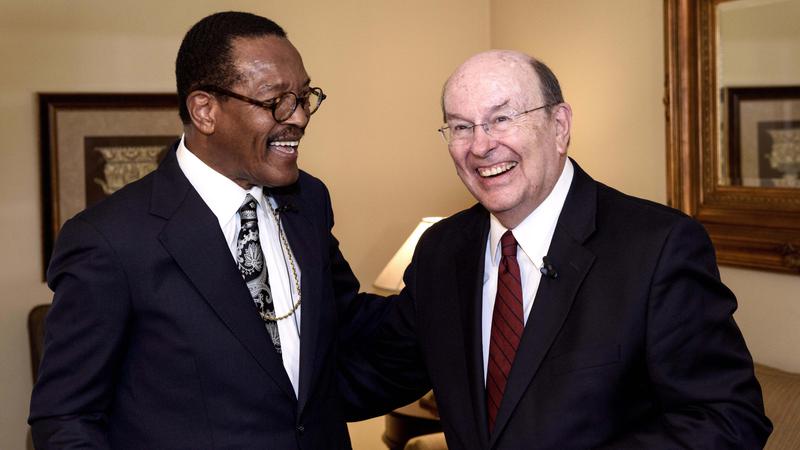Quoting an iconic Baptist preacher and a well-known Jewish rabbi, Apostle Elder Quentin L. Cook made the case Wednesday at the Princeton Theological Seminary in New Jersey that a “fairness for all” approach to religious freedom is critical because it preserves an important path to a meaningful life.
| Temple Square is always beautiful in the springtime. Gardeners work to prepare the ground for General Conference. 2012 Intellectual Reserve, Inc. All rights reserved. | 1 / 0 |
In 1957, Dr. Martin Luther King Jr. told followers to “find some great cause and some great purpose, some loyalty to which you can give yourself, and become so absorbed in that something that you give your life to it.” More recently, Rabbi Lord Jonathan Sacks praised modern man’s many advancements but noted that none of them answers three core questions: “Who am I? Why am I here? How then shall I live?” The result, Sacks says, is that we live in a time with a “maximum of choice and a minimum of meaning.”
Because religion is an indispensable aid for many to discover a more purposeful life (Dr. King is known as a civil rights hero, but his efforts were deeply influenced by his Christian faith), Elder Cook told gathered leaders of primarily black churches from around the U.S. that religious freedom debates must be framed with “fairness for all,” welcoming all voices to the public square.
In giving the opening address Elder Cook told the gathering, hosted by the Seymour Institute for Black Church and Policy Studies, that he is worried religion and accountability to God are too easily dismissed from the debate because they are seen as antithetical to the modern world.
“If there is to be ‘fairness for all,’ no one should face a threat to their very existence,” Elder Cook said. “All should affirmatively recognize that everyone is entitled to protection for their core freedoms and interests. We cannot abandon the basic moral high ground that gives meaning to this life and has guided civilizations for centuries.”
Church leaders have placed a heavy emphasis on this “fairness for all” approach in recent years because, as Elder Cook said, “we all do better when the voices of all minorities are given respect in our national dialogue.”
Other speakers at the event included keynote speaker Bishop Charles E. Blake, presiding bishop of the Church of God in Christ in Los Angeles, as well as Dr. Jacqueline C. Rivers and her husband, Reverend Eugene F. Rivers, who head the institute.
“We must do all we can to defend those whose lives are under threat because of their faith, and we must defend those who suffer while they embrace even atheism because as it is our right to believe in God, and it is their right not to believe,” said Bishop Blake, who served on President Barack Obama’s 25-person White House Advisory Council on Faith-Based and Neighborhood Partnerships. “Whether Christian or Muslim or atheist, we enrich the society when we are free to act in accordance with our conscience.”
Dr. Jacqueline Rivers, who, along with her husband, joined Latter-day Saint and other global faith leaders at the Vatican in 2014 to discuss the importance of marriage in society, said, “We really do want to reach out to all of these black denominations and bring them in because the black church has an important role to play on issues of religious freedom.”
“The issue of religious freedom for black people and the black church is really the issue of survival,” added Reverend Eugene Rivers. “All of these secular organizations who all believed the fiction that God was dead have now discovered that God is very much alive.”
In a private meeting between Bishop Blake and Elder Cook, he commended Elder Cook and the Latter-day Saints for “your strong principled position that you are taking on these issues and on the matter of freedom of religion. It is an integral to the survival of what we do that we be free to pursue it.”
